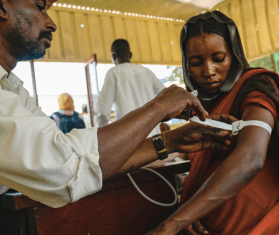To control the measles outbreak and protect vulnerable lives, Doctors Without Borders/Médecins Sans Frontières (MSF) launched a vaccination campaign that reached 9,634 children, primarily vaccinating those aged 6-59 months who are at most risk of severe complications from measles.
“For weeks, we didn’t know what to do,” says Fatima, a mother of three. “My youngest was coughing and had a fever, and others in our village were getting sick too. When we heard about the vaccination team coming, we made sure to get to them.”

Community involvement played a crucial role in the campaign’s success.
“We faced significant challenges, from difficult roads to unstable provisions of vaccines,” says Marwan Taher, MSF’s project coordinator in Rokero. “It wasn’t easy, but we knew how important this was.”
MSF teams worked together with the leaders of the community to spread awareness of the vaccination campaign to reach those most vulnerable, travelling to remote villages via donkeys, tuk-tuks, and cars. The teams set up the clinics in whatever public space was available: schools, markets, and health facilities, ensuring accessibility for local communities where rugged terrain and blocked roads often limit health care access.
Many families walk for hours to reach vaccination points, often navigating dangerous terrain. Abdurrahman, a father of five, explains: “The road was rough, and it had rained the night before. But with so many children falling ill in our village, we had to make the trip. Now, I’m relieved my children are protected.”
“This isn’t just about vaccinations,” says Taher. “It’s about working together to prevent a health crisis from getting worse. The community’s cooperation and determination were essential to achieving this.”

Malnutrition and other health issues must be addressed
Sudan has faced a humanitarian crisis for years that has become much worse since the war broke out between Rapid Support Forces and Sudanese Armed Forces in April 2023. While the measles outbreak has been contained for now, MSF is calling for sustained efforts to address the region’s broader health needs.
“We can’t afford for this to happen again,” says Fatima. “Now that my children are vaccinated, I’m less afraid. But we still need help to keep them healthy in the future.”
With a lack of international humanitarian response in the country, people do not have proper access to basic needs, including food, increasing the malnutrition rates to devastating levels. Between June and October, MSF teams screened vaccinated children for malnutrition and referred severe cases for treatment. Our teams found that 299 children under 5 years old presented severe acute malnutrition and 1,062 children between 6 to 59 months had moderate acute malnutrition.
"The malnutrition situation in Rokero is alarming and is a result of the decreased access to food,” says Merce Rocaspana, MSF’s emergency health adviser. “The war continues to create a humanitarian catastrophe with serious health complications.”
Routine immunization programs, nutritional support, and investments in health care infrastructure are critical to preventing future outbreaks.




